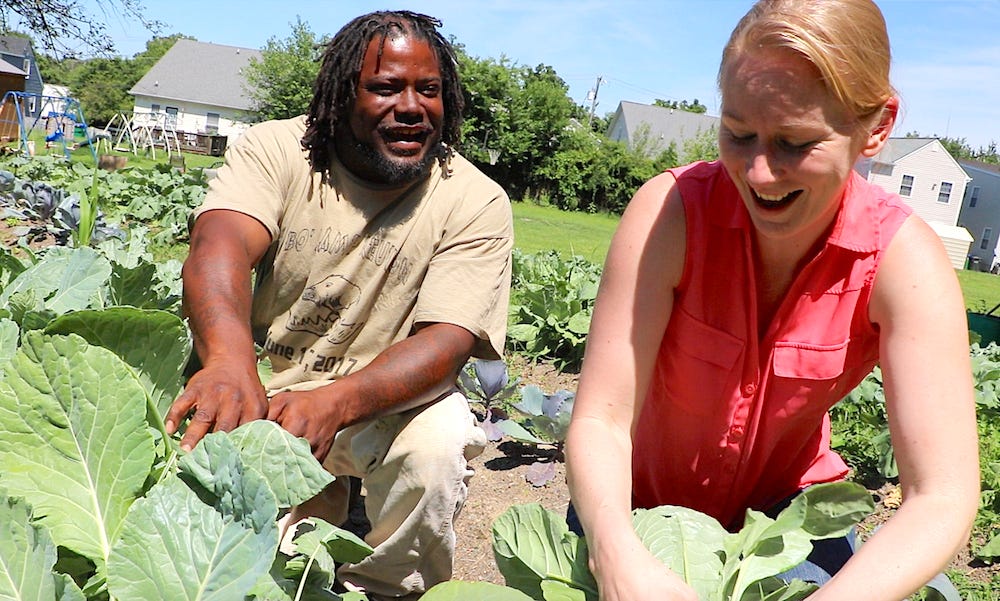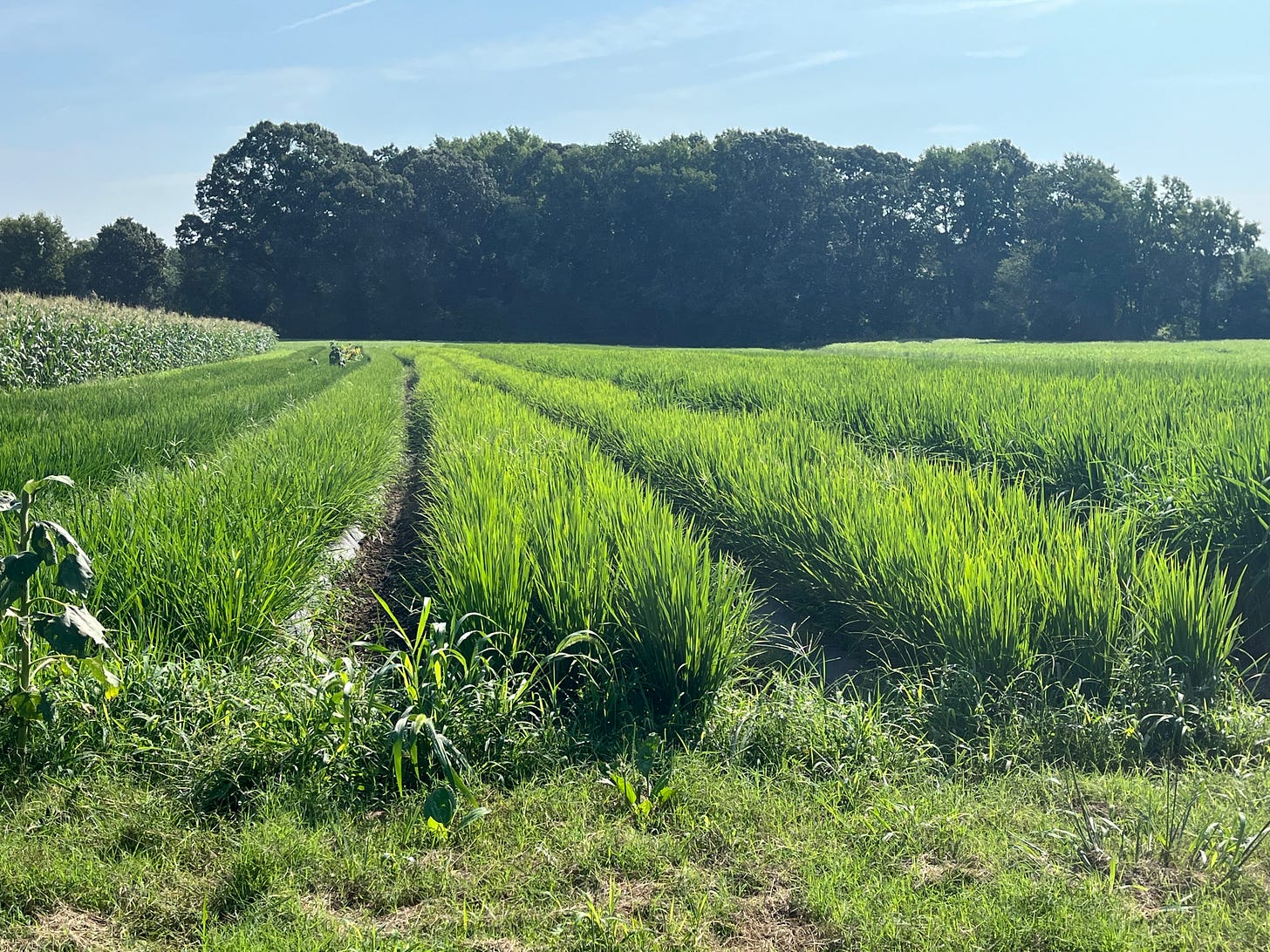Maximizing Food Security In A Broken System
Common does not equal normal
A few weeks ago, I went to one of those big box stores to get a few boards for my garden beds. As I entered the parking lot I was struck silent when I saw it filled with pallet after pallet of bagged soil. So many bags of topsoil and potting soil and mulch!
We’ve become accustomed to this.
It’s common.
As I looked at these pallets of thick plastic bagged soil, I thought, “what would our ancestors think?”
They’d probably wonder why we take dirt from one location, put it in small bags, secure those bags into bigger bags, fill wagons and carts with it, then lug it long distances and cram it into boats or trains for shipment hundreds of miles away to a distribution center, where the entire ridiculous process is repeated in reverse…
Of course, they would not know the dangers of ingested plastics yet. And, this is just a small representation of the many ways we’ve damaged our ecosystems not to mention our bodies.
Some recent studies share that we are each ingesting and inhaling somewhere between a little bit and credit card worth of plastic every week.1 Whether a lot or a little, plastics are a huge problem in our ecosystems and our bodies.
Much of the plastic in our systems is microplastics and nanoplastics, some of which come from the very packaging and process I described earlier.
This is common, so common, that we might even dismiss this staggering modern problem. Perhaps an even larger problem is that we’ve confused common with normal.
But can we afford to confuse common with normal?
Our food system, as it exists, relies on chemicals, confined animal feeding operations (CAFOs), plastics, exploitation of human labor, and horribly extractive practices.
I’m struck silent with the body of research that says American children can recognize 1000 corporate logos, but can’t identify even 10 native plants and animals in their area.2
But no, it’s not normal to wonder how much plastic we’re eating, how many chemicals are on and in our food, whether the animals were raised humanely, or how many people’s lives are destroyed to put cheap food on our table. It’s not normal to be ignorant about the natural world around us.
Again, we’ve confused common with normal.
With only about 1% of Americans as farmers today, our bureaucrats and corporate goons like to call our centralized food system “efficient.”
But this “efficiency” leaves me wondering how many years of natural topsoil we have left in nature, how we would get food to our tables in a crisis or natural disaster, how we would feed ourselves if hackers successfully shut down our systems, the electric grid goes down, infrastructure gets wiped out, or political upheaval leaves our communities vulnerable to violent gangs.
And none of this even touches on the myriad ways our modern, processed food is literally destroying our bodies.
Yes, our food system is broken.
And we’ve learned to accept this brokenness as normal.
In these unstable times it is dangerous to adhere to profitable ideologies that are destroying us.
Too often, I watch as we’re led to our own slaughter by outrage porn telling us how toxic our food system is without reminding us why we are here, and what we are truly capable of or how utterly normal it is to produce, process, and forage our own food.
We live in a time of brokenness, for sure. But that means it’s also a time for healing, a time for creation.
In the words of Clarissa Pinkola Estes, “do not lose heart we were made for these times.”
What does it mean to you to have food security?
Enough farmers markets close by? A grocery store in every community?
Does it mean plenty of EBT money to go around? Food pantries for all in need? Convenience stores and fast food on every corner? 10-years worth of dried foods and MREs in your garage?
Is that really food security?
Is that the vision you have for our children and grandchildren to grow up in?
The above are all common answers to the question “what is food security?”
But I’m going to challenge these common assumptions and say that true food security is having access to enough proper nourishment within an relatively easy walking or biking distance from where you live, work, or worship.
For most of human history food security via a local food system was both normal and common.
Normal is food produced right at home.
It’s women—and families—working together to create food security in their households and communities—cows, goats, or sheep serving a few families; small orchards and grain farms around villages; meat raised and butchered, or hunted and fished, in the immediate area where it’s eaten.
We simply cannot outsource our food security.
Not to politicians, or heads of agencies. Not even to “regenerative” farmers, religious leaders or popular speakers and influencers.
We must participate in every way we can as we aspire to radical interdependence and resilient systems.
What does that look like?
An American friend of mine grew up in a small, impoverished country. She tells me about how her family got meat. Each week, her mother would send her out, bucket in hand, down the street where one of the neighbors killed and butchered a cow or steer. There, the community members all gathered to collect their meat for the week. She would get her family’s portion of beef in her bucket, and it was so fresh, she says, that she would watch the muscles twitch as she carried it home.
Could we create hyper local food security here in America? Have we overemphasized food safety and convenience at the expense of actual food security?
I’m not talking about going back to some imaginary perfect past, but I believe we can create a new normal by learning from our history.
We must become producers, and we must encourage and inspire others to do the same.
Globally and historically, women are primarily responsible for food security in our households and communities.
Therefore, mamas are central to creating this new system.
Many women I talk to are longing for a new food system. We can see it and taste it. We want our food system to be part of what heals us.
We want our children or grandchildren to run a couple blocks to the local farmette to get milk and eggs for our daily meals. Many of us want to walk to the local food forest and gather our fruits and veggies for the day, meeting each other as we go, and together practicing the skills to transform these foods into the nourishing meals we all long for. We want to forage for berries and herbs, greens and pawpaws on the edges of our meadows, streams, and woods.
We want to come together to produce our own herbal medicines, to preserve the summer abundance, to make cheeses, yogurts, sausages, and breads with our own hands, in our own kitchens.
Can you see this too?
Increasing food security anywhere increases food security everywhere.
Remember, we were made for these times
We each must find our own entry to create our new food system that works with our ecosystems and human communities.
And we must change the laws where we live, work, and worship to make this vision adaptable everywhere.
The only way to create the change we want to see is if people get involved.
We the People have the power to bring a hyper local food system back to our households and neighborhoods and as we do, we change the minds and hearts of our friends, neighbors, and community members by normalizing hyper local food systems.
A great example of this is urban farmer Ron Finely. He grows food in the small aisles between the roads and the sidewalks in his city, South Central LA. And people constantly ask him why he plants it there… “Aren't you afraid people will take it?” And Ron says, “Why do you think I put it there?”
How do we maximize food security in this broken system?
Food security is radical interdependence—wherever you are—towards a healthy, transparent, and normal food system.
It’s getting our hands into that rich complex ecosystem we call soil, it’s in growing our own potatoes, milking a neighborhood cow, and preserving the food from our neighborhood harvests.
True food security is not wondering how much plastic we are ingesting every week or how many chemicals are in our food. It’s knowing that even if we’re fancied with a crisis or natural disaster, if hackers successfully shut down our systems, the electric grid goes down, infrastructure gets wiped out or political upheaval leaves our communities vulnerable to violent gangs…. that neighbors are already growing a food forest, running an apothecary, and making our own cheeses, breads, and sausages.
Food security is in the quiet mornings as we glimpse our own, lovingly tended compost piles that provide new soil for our gardens. And it’s in the day-to-day serenity of using our bodies to tend to the earth that nourishes and nurtures us all.
Yes, we were made for these times—to feed each other, grow our communities, and live with and within our ecosystems, beginning now.
That’s normal.
https://www.sciencedirect.com/science/article/pii/S2666911022000247







Great call to farms, Liz! I’m beyond proud that my two and a half year old doesn’t know a single corporate logo, but knows the names of a couple dozen plants and trees that grow in our garden.
Preach it!